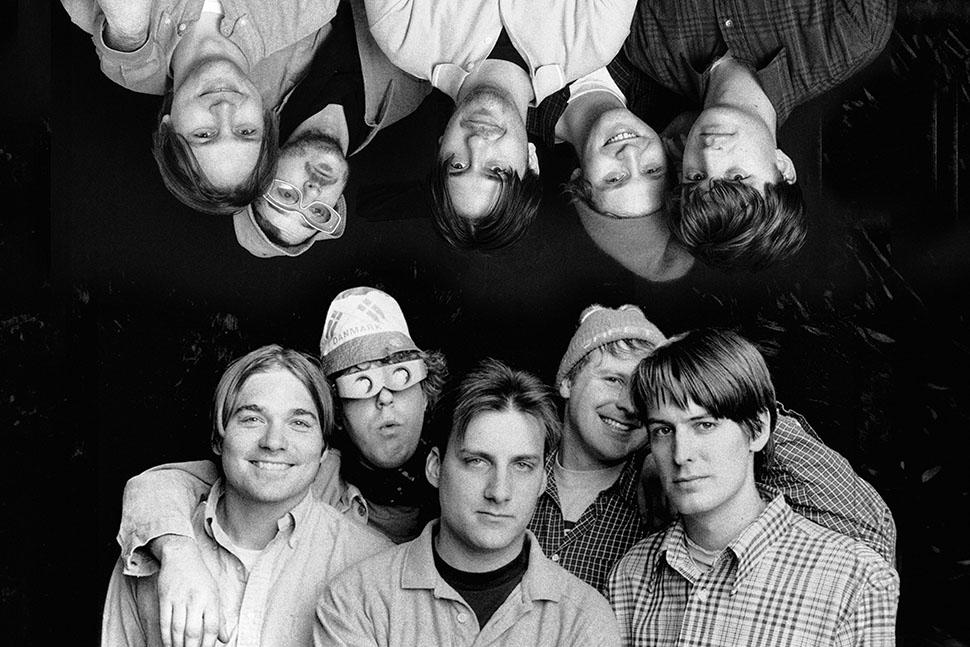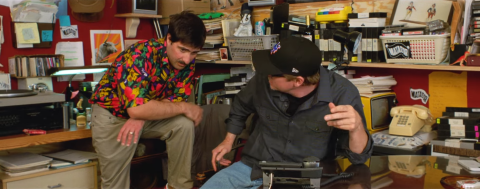In 2019, the people of Matador Records reached out to Alex Ross Perry for a documentary on the cult favourite band Pavement, one of the label’s stalwarts. That was also the year the indie rock’s long-enduring best-kept secret observed its 30th anniversary. In hindsight, we can only speculate if the label representatives could have anticipated the lengths to which Perry was going to celebrate the band’s legacy. Meanwhile, with their unforeseen (and perhaps unprecedented) popularity among TikTok users, propelling the former B-side single “Harness Your Hopes” (1999) to newfound virality, the timing could hardly have been better.
In a triad of its own, Perry, not long after work on Her Smell (2018) had come to a close, began outlining a chaptered three-part structure that soon turned into a much looser hybrid documentary. The Brooklyn-based auteur not only went into the private archives of band lead Stephen Malkmus but also directed a facetiously silly biopic, choreographed a stage musical and organised a pop-up Pavement museum in Lower Manhattan’s Tribeca, featuring memorabilia amassed over the band’s decades-spanning career.
Not all the artefacts displayed in the weekend-long exhibition were authentic, just as “Slanted! Enchanted! A Pavement Musical” and the biopic “Range Life” did not exist outside Perry’s superordinate project. However, accepting Perry’s very own directive — “If Pavement doesn’t have a museum or a musical, but we make them, and they are public events that thousands of people witness, doesn’t it become real?” — it’s worth pondering whether there are some higher truths out there that are only to be found in the artifice in which we present ourselves to the world.
At Venice, we talked to Perry and his editor Robert Greene about finding the right structure for his hybrid documentary Pavements (2024), the notion of directorial control and the newfound, manifold joys arising from the collaborative process.
One of the things I was most curious about was the way you approached structuring the film. How did that emerge?
Alex Ross Perry: The Mishima: A Life in Four Chapters1The American director’s most daring and visually striking work, separating the life of Japanese author Yukio Mishima’s life into four distinct parts. (Paul Schrader, 1985) approach was there originally. You take this artist about whom you can’t just tell one story. You have to do this approach, and that movie is chaptered. I originally felt that that’s kind of the correct structure.
Robert Greene: I forgot why we abandoned that. We were just like: “That’s not gonna work?”
ARP: Yeah, it’s this sort of thing that chapters work on paper, which is to say in a book. We basically abandoned it without even trying it because it’s just asking too much of people when you’re playing as many games as we are.
RG: So we decided just to toss that idea up like a salad and mix it up together.
ARP: Stuff like that just doesn’t work, because what you run up against is what you would see in omnibus films. It’s like: “Well, I really liked the first segment and then the second segment was terrible.” So by the third segment, I’m no longer humming. And that’s just part and parcel with something. We didn’t have to do that.
Was there ever a time when you conceived of the script or the final execution as even more blurry than it is now? Because, in that respect, you don’t confuse the audience too much and make clear which parts take place behind the scenes and which ones are scripted. Was there ever a version in which you try to make the lines more seamless?
ARP: No.
RG: We did screen a version of the full “Range Life” biopic to an audience who had a pretty good reaction to the humour and comedy in it and understood the irony. And even though it was somewhat explained, it sometimes goes sideways so quickly that you can’t really trace the source of how it went sideways. But it does.
And it’s basically because they’re just normal people and they’re not run like a business, not run like a machine at all. They’re just guys who made a band that happens to be, you know, my favourite band — and many people’s favourite band! But then they watched the thing, and they were just like: “Wait, what is this?” And I remember Alex being like: “I told them literally every bit of this.”
But it’s still weird to watch yourself in that context. To see things that you don’t even remember or things you didn’t like about how you were covered being parodied. And that was a weird thing. But that reaction — which you see in the film and which is very genuine — when our bass guitarist Mark Ibold says: “I don’t know what this is, and I’m wondering what the reaction to this is gonna be like.” He’s being very much like: “What the hell was this?” That reaction actually helped us figure out what to do with that biopic. We needed to cut through it. We needed to use it in the way the band uses irony and sincerity in their music. We needed to use the “Range Life” biopic as the ironic note next to the sincere note and let that go back and forth.
ARP: Basically, you’re parodying a genre that is bad. You write very cliché scenes with very cliché scenarios and very cliché dialogue. You shoot them very traditionally in a totally uninteresting way. The way all these movies were: “Surprise, surprise, none of those scenes are compelling for four minutes,” which is to say that you’ve nailed it, but then you just dissect what you’re doing.
And thankfully the DP, Robert Kolodny, and Robert Greene found this method on their other collaborations, where they’re like: “While shooting these biopic scenes, there are just other cameras rolling.” Like the scene with Joe Carey and Jason Schwartzman on the stairs, there’s another 30 seconds of that. But what becomes more interesting is this other camera I didn’t even know we had on, where I come in. And Jason says: “Do you think anything like this ever happened?” And I’m like: “No, nothing like this ever happened.”
And that’s a more interesting moment than playing out the rest of this ridiculous scene. It‘s very fortunate that we had it and that’s the way we wanted the movie to be. The process is more interesting than the end result because Pavement are fascinating, and Malkmus is a fascinating figure. But the music is not fascinating. The music is good, right?
RG: Well I think it’s fascinating!
ARP: I mean, it’s fascinating because of how it’s made. If you just played it for someone devoid of context, they’d be like: “It’s good.”
RG: I mean, it’s not like listening to E-L-R2Swiss Post-Doom Rock Band or something where you’re like: “How did they make that?” But I do think that there’s something in the music where it feels like it’s a put-on, it feels like it’s a reference and it feels like it’s trying to be pop and it feels like it’s resisting being pop and then it feels a little bit like, “Fuck you.”
And I think it’s difficult to make a film that embodies music because, in a way, cinema is an art form that has all the elements, but music is the purest, and that’s why these bad biopics have taken root, right? Because I can’t embody the sound of Tom Waits or Sonic Youth or Nirvana. I can’t really make you feel like it feels to listen to the music. So, I gotta tell this dramatic arc story with actors doing impressions like Bob Dylan or whatever. And I think that our goal was actually to try to embody the feeling of music. Because it is cerebral in one sense and a lot of feeling in another.
I was also thinking of the long discourse surrounding this idea of New Sincerity3The term “New Sincerity” was coined by Adam Kelly via his 2010 essay “David Foster Wallace and the New Sincerity in American Fiction,” in which he expands on Wallace’s anticipation of a new generation of fiction writers that would depart from postmodernist irony toward sincerity, which was expressed in the latter’s 1993 essay “E Unibus Pluram: Television and U.S. Fiction.” that came up in literature and film as well. And I was also wondering—
RG: I want to say something about that, actually, because I think part of the interesting thing here is our age difference. I’m a little bit older than Alex, so it’s a young Gen X and an older millennial perspective on these things. I’ve had so many annoying conversations with music friends — musical fans that are my friends — in which they’re talking about Pavement in this way that I really find irritating. Which is that the whole “poptimist” thing that a bunch of millennials got into was in some ways not entirely a response to Pavement, but it was a response to what Pavement represented.
So they kind of dismiss Pavement as this ironic thing. “Oh, these guys are just bored.” And I was like, that was never true! And the band always says, “We were not slackers. We were doing what we liked.” I think Malkmus was a great pop songwriter. Even Spiral’s4Scott Kannberg, Pavement’s guitarist and occasional lead vocalist songs that get into the records, they’re pretty good anthems!
I do think that there’s a resistance to that coming from me that I wanted to get across. I wanted to get to what I felt, because I remember when growing up, I always would talk about Malkmus’ lyrics like they were poetry and a lot of my friends were like: “You’re such a nerd,” saying that he doesn’t care about what he’s writing at all. And I was like: “No one who could write characters in his songs like this doesn’t care about what they’re doing.” So I was trying to get that in there.

Alex, earlier you said you didn’t even know that there was a camera at times. Which made me wonder how that could happen. Because I always think of directors as presumably in as much control as possible.
ARP: I don’t know. I just didn’t care that much; I just wasn’t paying attention. There’s all sorts of shit around a movie set. You don’t pay attention to all of it. I guess I probably knew. When we were filming the rehearsals in L.A. at some point, they’ve been rehearsing for like 12 days, and Mark picks up a bass and Malkmus goes: “Oh, when did you get a second bass?” And he goes: “I’ve had it a long time.” Malkmus goes: “Oh, yeah. I never noticed. That’s cool.”
So you just don’t notice stuff sometimes. Because there’s a camera somewhere down the hallway when we’re filming and presumably Rob turned it on an hour ago and it’s just rolling. I was spending so much time during that shoot trying to explain to the actors just what the hell we were doing that I was certainly not aware of another camera. There were times when we were shooting that biopic that we were shooting with three cameras rolling in three different locations, someone was filming the actors doing their fitting, someone was filming them building the set, and then we were filming the 16-millimeter auditions. I can only be in one place. So the rest of it is like a surprise.
RG: And a lot of it comes down to our director of photography, Robert Kolodny, who’s a director of his own rank.
With whom you have collaborated before…
RG: Yeah, I edited and produced his last film, Alex has worked with him constantly, with the music videos and the Ghost5Swedish rock band movie, Rite Here Rite Now (2024), that they just created together. And he’s the best, as the best documentary cinematographers are the people who love movies first and then love documentary filmmaking and people second. And those things are tied together. He’s constantly finding images. For the first Portland shoot — for the first rehearsals — Alex was supposed to go out, but couldn’t make it—
ARP: I decided to get COVID instead of going to shoot at the beginning of this new movie.
RG: It’s a cool idea that you had! But it was great because we knew Rob was going to be perfect alone. And he ends up with multiple cameras and is attuned to looking at one thing and seeing this other thing over there. Or if I see the other thing, he could do literally two things at once. It’s just the only guy you can do this with.
ARP: Yeah, he just had the ideas of where to place a second camera, these funny little ideas. I don’t really think too much about it.
So that means you would also give him some leeway in that respect. Is this different to your earlier work?
ARP: Yeah, on this movie, it just doesn’t matter as much, it was just designed not to matter. Like the idea of setting up one camera, lighting from one angle and framing one shot is really boring and not fun at all. For the museum day, we had the band there for three hours. We had seven cameras. I’m not monitoring any of them. I wasn’t monitoring a single camera. I was conducting the entire happening and I was telling the girl playing the reporter: “Okay, Malkmus is arriving at five, whatever you’re doing, you need to stop what you’re doing and you need to get on Malkmus.”
All the interview was him talking about the records and the sellout corner. I didn’t know any of that happened until I saw the footage because I was probably trying to keep the band performance schedule running on track or I was doing something else. And you can see five of our camera people in the movie and it was just more like: “I wanna plan this for ten months, we have four hours, and we’ll shoot like 15 usable minutes,” and that’s just a different way to do this. And it’s more interesting to me. I don’t know what we’ll get. I hope we don’t miss anything important. We did miss important things.
RG: Alex is one of my favourite collaborators to work with because there’s a really boring idea of what a director is. Rob is a director, I am a director, Alex is a director. I also edit, Alex writes for other people. Rob edits for other people and shoots. I don’t want to work with anybody who is like: “I need to see every frame.” It’s just the least interesting way to make anything these days, especially when you are working with incredibly talented people and you don’t need to monitor those things, and you’re not going to make the best thing that way.
And it’s a kind of really dated, boring idea of what a director is supposed to be. You can’t make this thing if it’s like one vision and we stick to it. It’s not my vision, it’s not Rob’s vision, it’s more Alex’s vision, but that’s the role. The director’s role usually is like: “I gotta step in and do the thing when no one else will do it. I gotta make that final call when there’s a bunch of people talking.” When Sean Price Williams6Sean Price Williams (director of The Sweet East [2023]) has worked as director of photography for a number of acclaimed filmmakers, among them the Safdie Brothers and Abel Ferrara. Williams has shot every one of Perry’s feature films, with the last one being Her Smell in 2018. is shooting, you’re talking about what the ideas are. It’s not like I need you to do this exact thing in this exact way. You can’t tell Sean what to do. But you’re talking about ideas.
The best directing Alex did in this film was just being enough of an asshole to pull off absolutely impossible stunts. Literally no one else would have the gall, the nerve and the stubbornness to try to pull off a musical, a museum and a 35-millimeter biopic shot on the short ends of Her Smell. That’s being a great director. It doesn’t mean you’re monitoring every image.
This actually answers a question of mine, which was about — and I don’t want to come off as moralistic — the idea of shooting the biopic, something the film itself disregards, on 35 mm, which is a fairly expensive thing that many filmmakers would like to do, but they will never have the chance to. And you’re doing this just as a sort of spoof.
RG: But spoof is also valuable art. It’s got its own value because the joke here is the various formats. But, yeah, it was the short ends, right?
ARP: Yeah, it was all the leftover film from Her Smell. We didn’t buy any of it.
RG: We wouldn’t have been able to afford it anyway. This is a Pavement movie. [laughs]
ARP: With some of these short reels we only had two minutes per roll. So we’re cobbling this filming together as best we can, economically. But the idea of shooting it on 35, I only did it because I had ten boxes of Her Smell short ends in the basement.
But the moralistic aspect of it is a conversation I’m fascinated by. We definitely tread into cautious waters with things like the museum and the musical, where we are absolutely fooling people. But not in a mean-spirited way. We’re actually giving people something positive in exchange for having them visit a room that they don’t know is a film set. We film for a movie that they know they’re in. We’re not tricking them, they’re in public and they’re at something that is celebrating the band that they care about. But those pieces of work had to exist independently enough to not have every single person who walked in go: “This feels fishy. I feel like I’m being pranked right now.”
It reminded me also that some filmmakers — Tsai Ming-liang, for instance — say that, to some extent at least, they see their future more in the museum space. And here you sort of make the museum space into a cinema.
RG: I love that as a comparison because every little card there that wasn’t Malkmus’s stuff was written by Alex. I really think it’s a screenplay turned into a space, basically, so it really is an interesting sort of overlap.
ARP: It’s also extremely comfortable. Take the musical: We rehearsed five days a week, for a month. We filmed two days a week. And I love the idea of: “I am making a movie. Everyone in this room is holding the script that I wrote and they’re performing songs that have been rearranged by my trusted musical collaborators. This is for a movie. We are not filming this.” That’s the best thing that could ever happen.
You’re making this movie with characters and actors and writing and wardrobe and there’s no cameras around, or there are cameras around, and somewhere in the middle is how the visual language of this exists. That to me is a wonderful creative process. Great movies that we love, they would probably rehearse for a month. They didn’t just get the actors on a Friday and start shooting on Monday. That’s not fun!
RG: The people who have liked the movie, it’s either Pavement fans who are like: “This is what it feels like to be on a Pavement show, this is what it feels like to listen to a Pavement record.” Or people who don’t know Pavement and are like: “This film is about art and the creative process.” And I think part of what makes that possible is that we had such fun making it.
I’ve never seen Alex happier than when pulling off these stunts. I’ve never been happier than when realising: “Oh, we can literally break all the possible rules of pacing and timing and rhythm and then ultimately tell a narrative story in many ways.” I think that our love of the process mimics and is related to Pavement’s love of their process. I think that’s the joy of the movie.
A funny thing I noticed at the end of my screening was people talking about the movie, and some didn’t even believe that the band existed…
RG: Yeah, I heard someone say something like that, too. It’s kind of weird that we counterintuitively might make it seem like Pavement didn’t exist at all. Although you could just go listen to the records. I did not see that coming.
ARP: But it’s easy to be inspired when you’re dealing with such inspirational artistic figures and how such a rich decade of productivity that they had continues to be interesting and relevant. Even the iconography of how Malkmus has made their collage album art inspired the visual palette that Robert wanted to create, where he would just put layers and layers and rip stuff off. That’s kind of the editing of the movie. Robert could show you a timeline of the edit, it looks like a collage, making something on paper with images, which is what the Slanted and Enchanted (1992) cover looks like, and you just write shit on it in sloppy handwriting and then add thirty years and it’s iconic.
RG: Yeah, Malkmus said: “I just wrote some mumbo jumbo and I just made some stuff up.” That’s exactly what editing is.

As for a last question, I remember reading in 2019 Alex’s piece in Indiewire about Marvel and Avengers: Endgame (Russo Brothers, 2019)7In said piece, Alex Ross Perry, who, from his childhood, has been an avid reader of comic books, embraced the magnitude and cultural status of superhero blockbusters, stating that he would “like to see Avengers: Endgame win best picture at the 2020 Oscars.”. And I must admit, back at the time, I was somewhat fearful because there are people like Barry Jenkins who say: “Oh, it’s the best decision of my life to make The Lion King II” or something like that. Pavements is so much the opposite of what I had feared at the time! And based on the film, it feels like you want to work more experimentally. Does this feel like a new phase in your career?
ARP: I don’t know. I know Barry’s been working on that movie for as long as we’ve been working on this, but he’s also gotten paid a lot more than I have in exchange. That what’s interesting. I just have to work with people that I can stand and there’s so many people that I can’t stand, for better or worse. That’s probably going to be my downfall, ultimately.
But I can’t focus for a day, I couldn’t — I’ve never been given the chance — on something that is not creatively interesting to me in some way. Whereas something like Pavements, I couldn’t stop thinking about this because we couldn’t quite figure it out until it was figured out.
I was telling Robert the other day that I’m just more interested in the process — in creating things than in having created things. And when you’re making products like The Lion King, the only thing you’re doing it for is for the end result. Whereas with something like Pavements, the process wasn’t like a $100 million budget or a $100 million opening week. I got to make a musical, which was a dream. I got to make the museum, which is a dream. I’d rather learn how to work in musical theatre for a big segment of a real movie than learn how to work with the VFX team for motion capture.
RG: I would say what we’re interested in is big-budget experimental films because we have kids. I have kids, one in college and one in high school, Alex has a kid. We’re exactly like the band. The band was like: “We don’t want to be a bad version of ourselves.” You hear Malkmus say: “We don’t want to sell out and be worse and start sucking.” They stuck to what they are, they had to pay some — a lot of — financial price for it. They’re regular guys with regular budgets in their lives. But when they get back together, everyone’s like: “Yeah, you stuck to your guns and you made the thing and you didn’t compromise and you didn’t suck.” And that’s what we would like to be.

Patrick Fey is a freelance critic, whose writing has appeared on Kino-Zeit, Critic.de, Filmstarts and Moviebreak.




